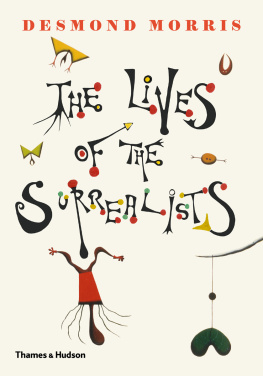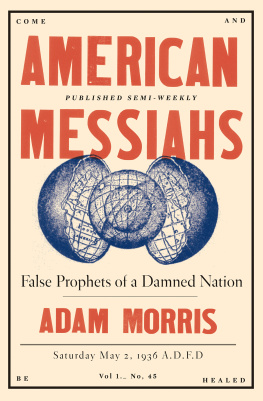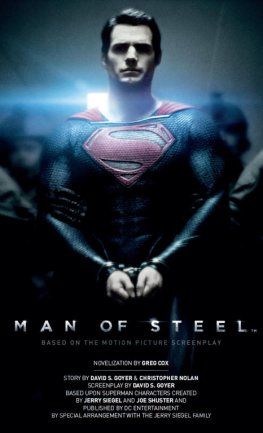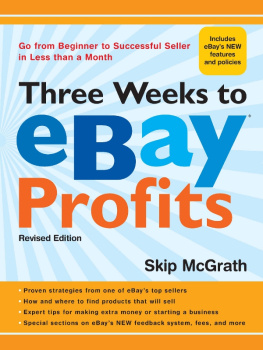Morris - My Dog Skip
Here you can read online Morris - My Dog Skip full text of the book (entire story) in english for free. Download pdf and epub, get meaning, cover and reviews about this ebook. City: New York;Mississippi, year: 2008;1995, publisher: Knopf Doubleday Publishing Group;Vintage Books, genre: Non-fiction. Description of the work, (preface) as well as reviews are available. Best literature library LitArk.com created for fans of good reading and offers a wide selection of genres:
Romance novel
Science fiction
Adventure
Detective
Science
History
Home and family
Prose
Art
Politics
Computer
Non-fiction
Religion
Business
Children
Humor
Choose a favorite category and find really read worthwhile books. Enjoy immersion in the world of imagination, feel the emotions of the characters or learn something new for yourself, make an fascinating discovery.

- Book:My Dog Skip
- Author:
- Publisher:Knopf Doubleday Publishing Group;Vintage Books
- Genre:
- Year:2008;1995
- City:New York;Mississippi
- Rating:5 / 5
- Favourites:Add to favourites
- Your mark:
- 100
- 1
- 2
- 3
- 4
- 5
My Dog Skip: summary, description and annotation
We offer to read an annotation, description, summary or preface (depends on what the author of the book "My Dog Skip" wrote himself). If you haven't found the necessary information about the book — write in the comments, we will try to find it.
My Dog Skip — read online for free the complete book (whole text) full work
Below is the text of the book, divided by pages. System saving the place of the last page read, allows you to conveniently read the book "My Dog Skip" online for free, without having to search again every time where you left off. Put a bookmark, and you can go to the page where you finished reading at any time.
Font size:
Interval:
Bookmark:
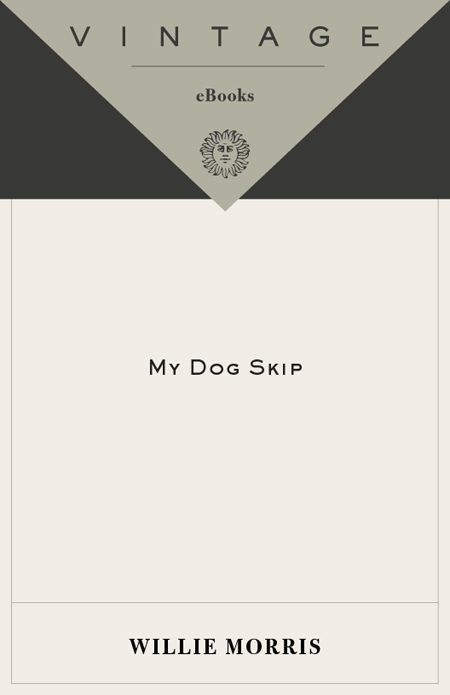
My Dog Skip
This book is both a loving tribute to his companion and a lyrical remembrance of vanished innocence.
People
A memoir of [Morris's] beloved boyhood friend, companion and fellow prankster. It's a rich experience all around.
The New York Times Book Review
This marvelous memoir, like the Oscar-winning Forrest Gump, takes you back to an era of innocence.
Los Angeles Times
If the rat race is getting to you, if you long for long hazy summer days of wandering barefoot around town seeking whatever adventure could arise, if you had a dog that was THE dog MyDog Skip is for you Skip lives on in a million fond memories.
Times Record News (Wichita Falls, Texas)
Morris's clean, spare, emotionally laden prose captures his youth and America at mid-century with crystal clarity and draws the reader into reading and rereading beautifully turned sentences and phrases. This is a book that begs to be read aloud. No one who had a dog as a child can remain unaffected by this gem of a book.
Flint Journal (Michigan)
This is the kind of book that makes readers smile.
Patriot Ledger
My Dog Skip
North Toward Home
Yazoo
The Last of the Southern Girls
James Jones: A Friendship
The Courting of Marcus Dupree
Terrains of the Heart
Always Stand in Against the Curve
Homecomings (with William Dunlap)
Faulkner's Mississippi (with William Eggleston)
After All, It's Only a Game (with Lynn Green Root)
New York Days
Good Old Boy (a juvenile)
Prayer for the Opening of the Little League Season
(with Barry Moser)
My Dog Skip
Willie Morris is the author of North Toward Home, New York Days, and two novels. As the imaginative and creative editor of Harper's, he was a major influence in changing our postwar literary and journalistic history.
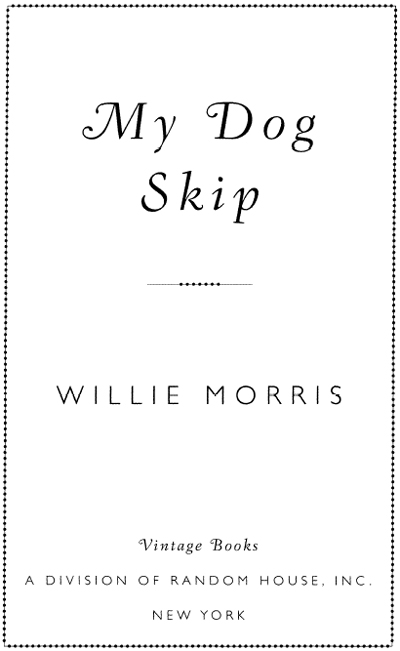
To Anne-Clinton and Winston Groom,
to their dog Forrest Gump
and to everyone else who ever loved a dog

1
2
3
4
5
6
7
8
9
10
11
A Faded Photograph
I CAME ACROSS a photograph of him not long ago, his black face with the long snout sniffing at something in the air, his tail straight and pointing, his eyes flashing in some momentary excitement. Looking at a faded photograph taken more than forty years before, even as a grown man, I would admit I still missed him.
It was 1943. I was nine years old and in the third grade when I saw him for the very first time. I had known we were getting him. My father had ordered him from a dog breeder he had heard about in Springfield, Missouri. Daddy had picked him up at the Illinois Central train depot, and when I came home that day from school he had just put the wire portable kennel on our back porch. I opened the door to the box and looked inside. I saw a little puppy drinking water from a container attached to the bottom. He glanced up at me.
Come here, boy, I said.
He walked on unsteady legs toward me. I was sitting on the floor of the porch when he came out. He jumped into my lap and began nuzzling my hand with his nose. When I leaned toward him, he gave me a moist lick on my chin. Then he hugged me.
I led him into the house and gave him some puppy food in a dish. Then I followed him as he gingerly explored every room in the house. That night he jumped into my bed and stared at me, as if he were looking me over. Then, perhaps because he missed his mother in Missouri, he went to sleep in my arms. I was an only child, and he now was an only dog.
This was the first of our many days and years together. We named him Skipper for the lively way he walked, but he was always just Skip to me.
We had had a whole string of dogs before. When I was a very little boy we had big bird dogs, and then two purebred English smooth-haired fox terriers like this one, and I got to know all about dogs, a most precocious experttheir funny or crazy moods, how they looked when they were hungry or sick, when they were ready to bite and when their growling meant nothing, what they might be trying to say when they moaned and made strange human noises deep in their throats.
None of those other dogs ever came up to this one. You could talk to him as well as you could to many human beings, and much better than you could to some. He would sit down and look you straight in the eye, a long, mesmerizing gaze, and when he understood what you were saying he would turn his head sideways, back and forth, oscillating his whole body like the pendulum on a clock. Before going to sleep at night, with him sitting next to my face on the bed as he always did in such hours, I would say, First thing tomorrow I want you to get your leash and then come get me up, because we're gonna get in the car and go out to the woods and get some squirrels/ and the next morning sure enough he would get his leash, wake up both my father and me, walk nervously around the house with the leash in his mouth while we ate breakfast, and then lead us out to the car. Or I could say, How about a little swim? and his face would light up and he would push open the back door with his paws and escort me the quarter of a mile down the back alleyway to the swimming hole under the cypress near the bayou. Or, Bubbas comin over here today, and we're gonna play some football/ and he would listen closely to this, and go out and wait around in front of the house and pick up Bubbas scent a block down the street and come tell me he was on his way Or, Skip, how about some catch? and he would get up and walk into the front room, open a door in the antique cabinet with his improbable nose, and bring me his tennis ball.
I watched him grow up from the puppy who came to us from Missouri to the sleek, dexterous, affectionate creature who could do all these things, and more. He knew my father by the name of Big Boss. My mother was Bossie, and I was Little Boss or, interchangeably, Willie. (I called him, depending on the mood, Skip, Old Skip, and Boy. I have learned that when you love somebody, you will address him or her by different names.) Sometimes my father would hide in a closet and I would ask, Skip, where's Big Boss? and he would search the whole house, looking on every bed and under every chair and table until he arrived at the right closet, and began scratching it with his paws.
The town where Old Skip and I grew up together was an unhurried and isolated place then. About ten thousand people lived there, of all races and origins, and it sat there crazily, half on steep hills and half on the flat Delta. Some of the streets were not paved, and the main street, stretching its several blocks from the Dixie Theater down to the bend in the river, was narrow and plain, but down along the quiet, shady streets, with their magnolia and pecan and elm and locust trees, were the stately old houses that had been built long before the Civil War, slightly dark and decaying until the descendants became prosperous enough to have them restored, which usually meant one coat of white enamel.
Font size:
Interval:
Bookmark:
Similar books «My Dog Skip»
Look at similar books to My Dog Skip. We have selected literature similar in name and meaning in the hope of providing readers with more options to find new, interesting, not yet read works.
Discussion, reviews of the book My Dog Skip and just readers' own opinions. Leave your comments, write what you think about the work, its meaning or the main characters. Specify what exactly you liked and what you didn't like, and why you think so.

